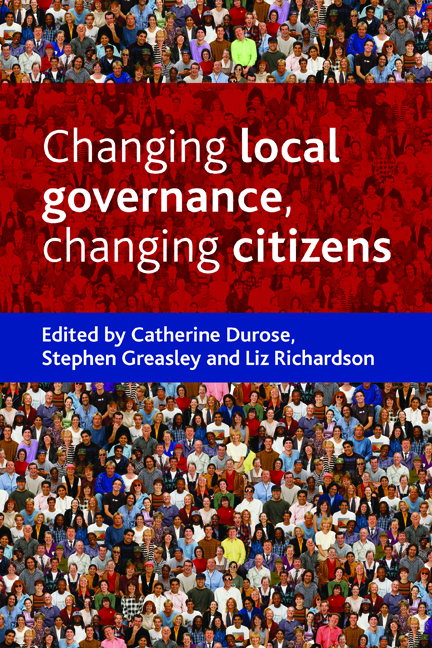Book contents
- Frontmatter
- Dedication
- Contents
- List of boxes and tables
- Acronyms
- Notes on contributors
- Acknowledgments
- Foreword
- Preface
- one Changing local governance, changing citizens: introduction
- two Citizen governance: where it came from, where it’s going
- three ‘Neighbourhood’: a site for policy action, governance … and empowerment?
- four Urban housing market restructuring and the recasting of neighbourhood governance and community
- five Citizen aspirations: women, ethnicity and housing
- six Can we promote cohesion through contact? Intergroup contact and the development of community cohesion
- seven New migrants, citizenship and local governance: ‘Poles’ apart?
- eight Citizens of faith in governance: opportunities, rationales and challenges
- nine Citizens’ reflections on behaviour change policies
- ten Every child’s voice matters?
- eleven e-citizenship: reconstructing the public online
- twelve Conclusion
- Index
Foreword
Published online by Cambridge University Press: 16 July 2022
- Frontmatter
- Dedication
- Contents
- List of boxes and tables
- Acronyms
- Notes on contributors
- Acknowledgments
- Foreword
- Preface
- one Changing local governance, changing citizens: introduction
- two Citizen governance: where it came from, where it’s going
- three ‘Neighbourhood’: a site for policy action, governance … and empowerment?
- four Urban housing market restructuring and the recasting of neighbourhood governance and community
- five Citizen aspirations: women, ethnicity and housing
- six Can we promote cohesion through contact? Intergroup contact and the development of community cohesion
- seven New migrants, citizenship and local governance: ‘Poles’ apart?
- eight Citizens of faith in governance: opportunities, rationales and challenges
- nine Citizens’ reflections on behaviour change policies
- ten Every child’s voice matters?
- eleven e-citizenship: reconstructing the public online
- twelve Conclusion
- Index
Summary
Unlike most UK citizens, I do spend many hours reflecting on the details of our governance structures and processes. What drives me to these issues, and gives them great importance for me, is a concern about how enfeebled citizens feel about their engagement with our political system and more broadly their lives in neighbourhoods and communities. Over the last decade and more I have worked with colleagues from Local Governance Research Unit, De Montfort University and the Institute for Political and Economic Governance, University of Manchester on issues of citizen engagement. I know the depth of understanding and insight they bring to the table so it's a pleasure to be able to support this book.
In a globalised and interdependent world it is increasingly challenging to offer citizens a direct sense of empowerment, which makes the importance of affording opportunities at the local level even more vital. This book is valuable above all because it recognises that if citizenship is going to be a living practice rather than a spectator sport for most citizens we need to create a far wider set of opportunities for real decisions to be made at the local level that people care about.
The 2008 White Paper Communities in control notes:
In the period from April to December 2007, only two fifths (38%) of respondents to the Citizenship Survey felt they could influence decisions in their local area and one fifth (20%) of people felt they could influence decisions affecting Great Britain. (p 10)
These figures suggest a gap between the local and the national sense of subjective empowerment. We are building on a stronger base at the local level but there is still a long way to go. This book offers us much valuable evidence about some the hurdles to be faced and how they might be overcome.
The Labour government since 1997 has been slow to recognise the importance of the issues of active citizenship. Its agenda for local government has been more managerial and focused on service delivery. And to an extent the agenda has delivered; local government is better managed, more strategic and more joined up than ever before. It delivers many services with efficiency and many of its practitioners have delivered real and imaginative community leadership. The trouble is that citizens have been largely left behind in this managerial revolution.
- Type
- Chapter
- Information
- Changing Local Governance, Changing Citizens , pp. xvii - xxPublisher: Bristol University PressPrint publication year: 2009

